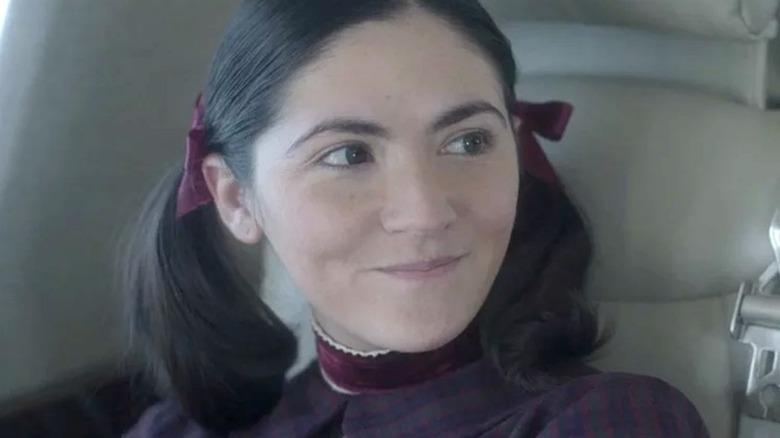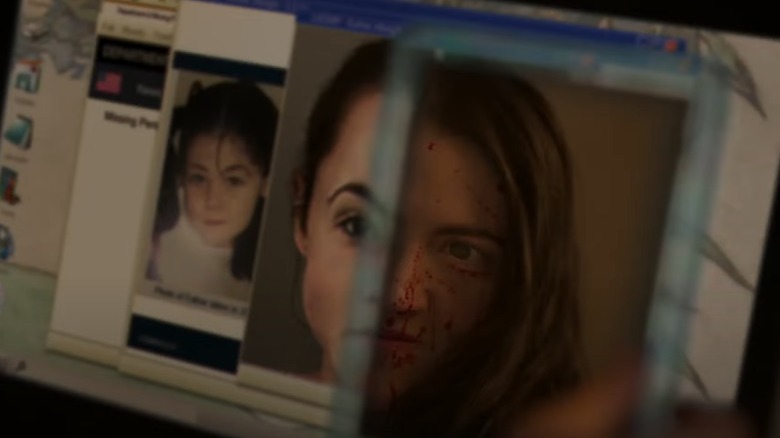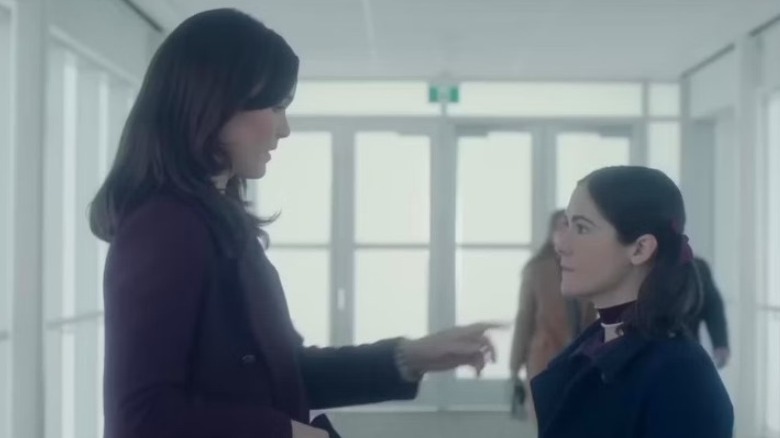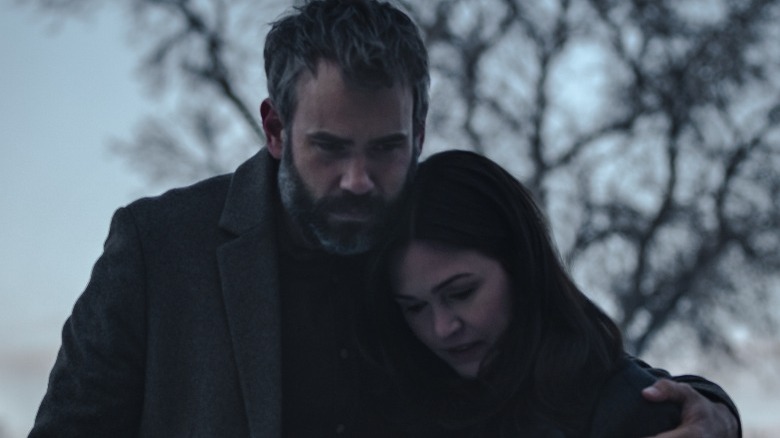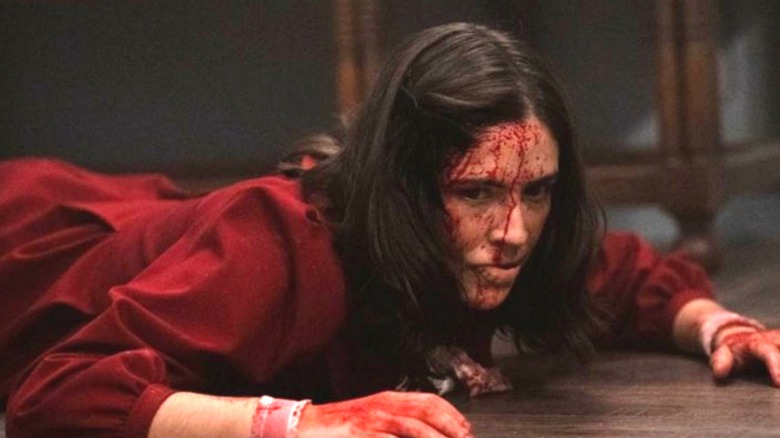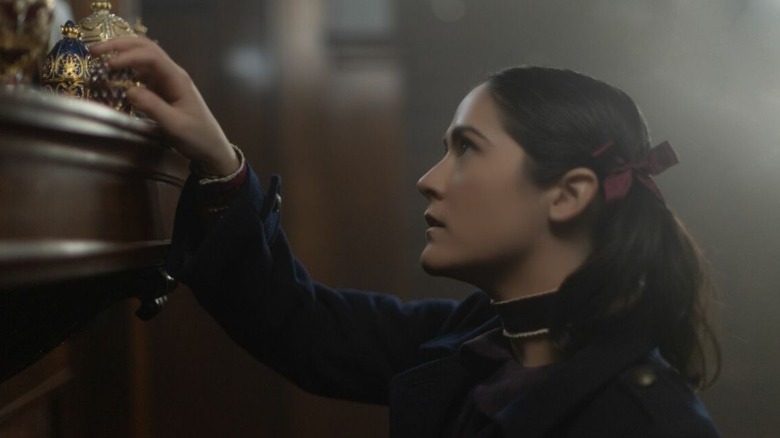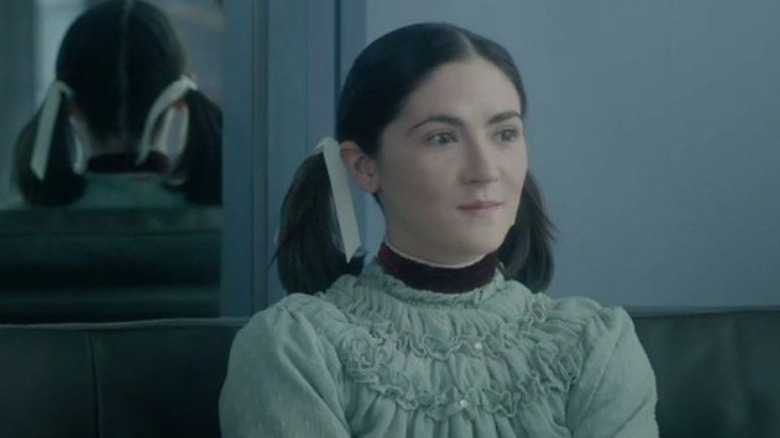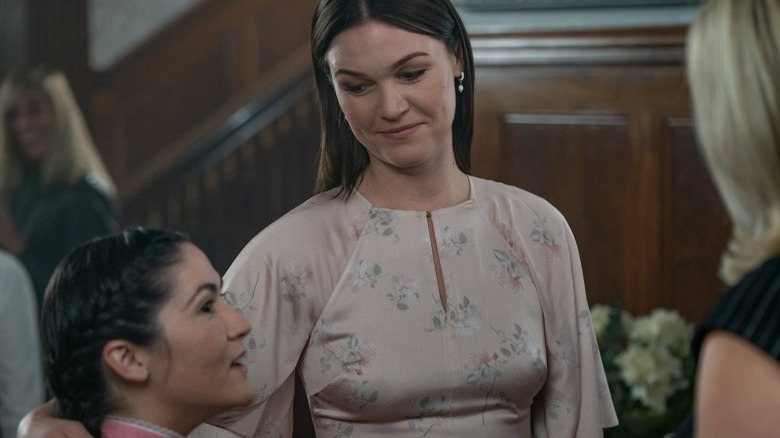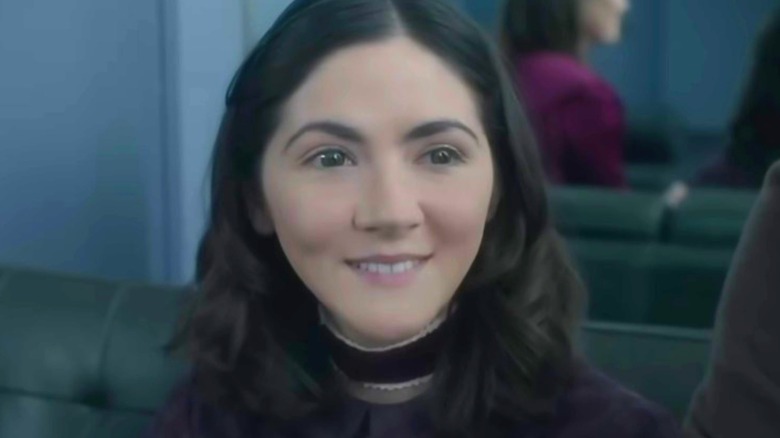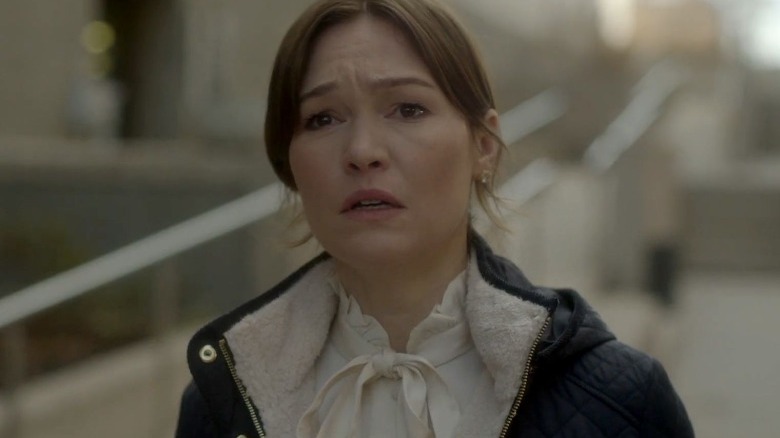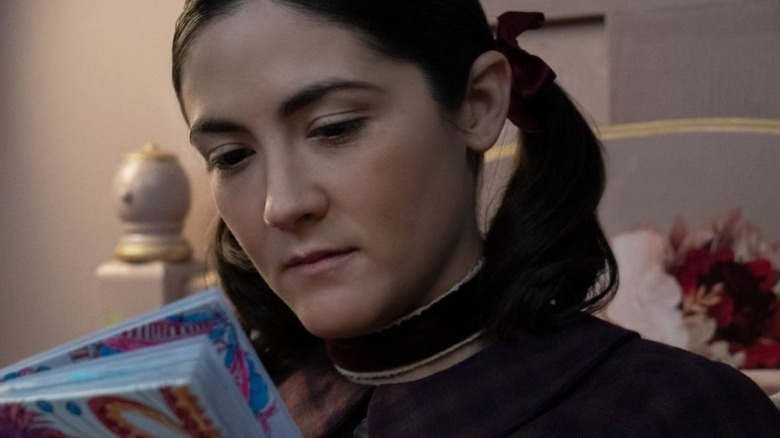The Ending Of Orphan: First Kill Explained
What would you do if you perpetually had the appearance of a child well into your adult years? Would you exploit your condition for your own gain? Maybe you could eat for free at IHOP as many times as you wanted. Or you could pose as a long lost little girl, join a family, and wreak havoc before murdering everyone and moving on to the next gig. If that went from zero to ten way too fast, thank Esther for being a trailblazer. Or maybe we should say you can thank Leena.
In 2009, the horror film "Orphan" arrived in theaters to disturb viewers with the notion that a little girl could be so violent and, well, evil. Kate (Vera Farmiga) and John Coleman (Peter Sarsgaard) learn this the hard way when they adopt little Esther (Isabelle Fuhrman) into their family. Of course, when the film's climactic reveal comes, we learn that "Esther" isn't a child after all — she's a full-grown adult named Leena who looks like a child thanks to a condition that manifests as proportional dwarfism.
The 2022 prequel "Orphan: First Kill" takes viewers back to Leena's beginnings in the Saarne Institute in Estonia, where she already has a reputation for being the most dangerous patient in the psychiatric hospital. The story begins as she plots her escape and manages to con her way to America, infiltrating a grieving family by posing as a girl who's been missing for four years. While this prequel obviously can't rely on the same twist the first film was built around, "First Kill" makes the brilliant move of taking a decidedly different turn from its predecessor. Let's delve into Leena's horrific adventure and dissect the themes and implications of her story.
Leena's psychology
From Leena's future adventure with the Colemans in the original "Orphan," we've already learned a little bit about Leena's origins. In "First Kill," we travel back to see firsthand just how she became the Esther we met in the 2009 film. One crucial question: Aside from the physical condition that makes her look so much younger than her real age, what is wrong with Esther?
Neither of the "Orphan" films offers an official diagnosis for her particular mentality. One thing is certain, however — Leena is completely in control of her actions, unlike many of the other patients depicted throughout Saarne. Is she just plain evil, solely making choices based on her most carnal impulses? The professionals at the facility inform us that Leena landed in the institute after her first killing spree, and she's even murdered a therapist.
However, she manages to orchestrate her own escape, which takes careful planning. After stowing away in the car of an art therapist who's just rejected a position at Saarne, Leena murders the unsuspecting woman and uses her computer to find information about a missing girl from the United States, setting out to assume a new identity. While the circumstances of Leena's charade are mostly believable, it's difficult to believe that DNA testing wouldn't have been performed when someone claiming to be a missing child turns up. But maybe that misstep is simply foreshadowing a revelation yet to come about her newfound family.
The exploitation of grief
Grief is a common theme throughout the history of horror, and the "Orphan" movies carry all the hallmarks of that tradition. Perhaps it's because grief is so darkly relatable in all our minds, and the fear of it helps lay the groundwork for true and unrelenting horror. But one thing is certain — evil often exploits the pain of loss. Leena clearly knows what she's doing as she expertly mimics a girl who would have aged four years.
Banking on the family's dreams of a reunion all but satisfies her plan to escape to the United States. She initially doesn't intend on staying very long — the overbearing scrutiny of Tricia Albright (Julia Stiles) and the bullying of her son Gunnar (Matthew Finlan) wears thin fast, and Leena packs up and attempts to the hit the road. But she's stopped by her infatuation with her supposed father, Allen (Rossif Sutherland).
This mirrors Leena's future as an adopted orphan in the Coleman household. While she didn't necessarily choose the Colemans, she still found herself in a home ravaged by the anguish of loss after the death of Kate's third baby. This doesn't stop Leena from leveraging Kate's pain against her as a smokescreen to make her seem unhinged. There again, Leena's plans for murder and mayhem are complicated her obsession with her adoptive father, John.
A fatal attraction
We don't know much about Leena's past. It's hard to say what has stirred up her obsession with various men that come into her life as supposed father figures. However, her attraction to her surrogate fathers typically leads to the undoing of her act, resulting in multiple casualties each time, typically at Leena's hands.
One thing we do know, however, is that she's often not treated well by her peers (both other children who seem to be her peers, and some adults who actually should be). Perhaps, this is due to her condition or her outdated sense of fashion. Every time she's insulted, Leena demonstrates her vindictiveness. In the original film, she shoves a young girl off of playground equipment for disparaging her.
However, "First Kill" shows that Leena does have a different side to her. Every time she's in Allen's presence, her demeanor changes. Even though she's still pretending to be his daughter Esther, you can sense an undertone of genuine cheer and calmness. Her interactions with her surrogate father are, perhaps, the most truthful she has ever been in her entire history of conning doctors, orphanages, and adoptive families. Isabelle Fuhrman does a stellar job communicating this shift in Leena's temperament through subtle fluctuations in her body language and emotive expression whenever Allen is present. It's fascinating, though, to think that Leena could have been halfway across the country if it weren't for her attachment to Allen. The rest of the Albrights might still be alive ... and in jail for the crimes that come to light later in the story.
Blinded by desperation
Viewers watching the first half of "Orphan: First Kill" might think they're just getting a simple retread of the original 2009 film, merely with a different family in a different set of circumstances. That's partially how "First Kill" proceeds, but the prequel has a trick up its sleeve that turns the audience's preconceived notions against them. We learn mid-way through the film that Leena's would-be mother Tricia is a cold-blooded killer. Just as a detective is closing in on uncovering Leena's secret, Tricia murders him before Leena's eyes, and proceeds to reveal that Esther's brother, Gunnar, actually killed the real Esther by simply taking his childish antics "too far." The twisted mother-son duo have been covering for each other all along, and Leena has unwittingly threatened their façade.
That leaves Allen as the sole individual with any sense of decency and normalcy in the Albright household. Somehow, he doesn't see through Leena's act as his long-lost daughter. He embraces this newer, older Esther, believing the joy that he once lost has seemingly returned. Of course, if he ever learned the truth about his daughter's demise and his wife and son's misdeeds, he'd be in for a greater world of hurt.
Allen never realizes Leena is a fake until the final moments of the film atop their burning home. After Tricia attempts to convince him, Allen sees the fake teeth that Leena has in place to cover her adult chompers, just before falling to his own death. But it might be easier to make sense of Allen's ignorance through the lens of grief once again — his own desperation has simply blinded him to the idea that this girl might not be who she says she is. They say ignorance is bliss, and Allen is a walking endorsement of that idea.
The unseen art
Leena's journey is symbolized through a subplot about Allen's art. After his daughter "returns" to him, he proudly shows off what he's been doing in her absence, with his paintings having served as an outlet for him. Leena's version of Esther even shows the enthusiastic father that she has a knack for artistic talent herself. But Allen's paintings take an undeniably dark twist as he reveals to Esther that there are still elements of his paintings that she can't see. Once he turns on a black light, however, she can see the glow of paint that was once invisible to the naked eye, turning them into entirely different works of art.
This is obviously where Leena learns of this artform that she uses in the original film during her stay with the Colemans. In "Orphan," she'd create grandiose pieces depicting the orphanage, but the black light would show what was truly there all along -– images of murder, torment, and mayhem. This is entirely symbolic of Leena's story. She perpetually lives in the skin of other people, whether real or made-up. It's only when the true Leena emerges that darkness manifests through her actions, showing the cracks in her unscrupulous persona. For all intents and purposes, she is the unseen art.
The biblical history of Leena
Leena truly is a force to be reckoned with. She's highly intelligent and extremely manipulative. We can probably even add ninjutsu to her list of skills, considering that her capabilities of stealthily sneaking around are top-notch. But let's not forget her penchant for murder just to get what she wants. Deep down, there's a human inside that strange, childlike exterior, but she only comes out when in the presence of Allen, her surrogate father. The rest of the time, she's calculating her next move.
The 2009 film showed us that she carries a Bible with her that she took from the Saarne Institute. It's the one item that really sent Kate down the rabbit hole after having the inkling that there was something not quite right about the girl she adopted. In "First Kill," the same thing occurs when Tricia sees the Bible. Of course, Tricia's known all along that Esther's actually an imposter. However, she is now starting to understand just what she's dealing with.
It's in this Bible that Leena keeps the pictures of the men she has pined over during her murderous career. She longs for companionship, something that likely feels impossible given her child-like appearance. It's quite illuminating that she keeps her truth locked away in a book of faith.
A family of murderers
Leena knows that Detective Donnan (Hiro Kanagawa) is hot on her heels. It's obvious he suspects that her identity is a front when he's seen snapping photos of Leena out in public. After he snags a fingerprint and compares it to Esther's, he sees that its not a match. Of course, Leena is just two steps away breathing down his neck. She savagely stabs the poor detective, but before she can finish him off, a bullet suddenly does the job for her. That's when it's revealed that Tricia is standing by with a gun in hand, ready to tell Leena her story.
Now that the cat's out the bag regarding Tricia's protection of Gunnar, she coaxes Leena to share everything about herself. As their shared secrets turn into a case of mutually assured destruction, Tricia orders Leena to continue the charade — or else. Of course, it's hard to trust Tricia now that we've seen her commit cold-blooded murder to protect herself and her son.
Later in the film, Gunnar threatens to kill Leena just like he killed his real sister. That doesn't exactly sound like someone living with regret or remorse. Furthermore, once Tricia and Gunnar both resolve to kill Leena, they seem genuinely excited to do the deed. Was Esther's death an accident? It almost seems like that might be just as much a lie as Leena's assumed identity.
A means to an end
For a time, it almost seems like Leena and Tricia could work out a great partnership. After all, Tricia only continues to use Leena to bring her husband peace despite knowing deep down that his daughter is gone. It's kind of ironic, then, that Leena gets a taste of her own medicine. She's being used, and for a short while she doesn't even realize it. But once her relationship with Tricia sours, she quickly understands the hole that she's dug for herself in this new American home.
"First Kill" establishes that Leena is quite intelligent, but she's not a pro at enacting her cons quite yet. Almost immediately, the gaps in her story start to show when she "misremembers" the bird in the office of the therapist who had treated Esther years before. Additionally, everyone starts noticing her accent. Of course, that might be somewhat explainable having allegedly lived abroad for four years as part of her cover story. But the point remains that Leena is still figuring this out as she goes. At first, she only uses the act to get a trip across the pond, but then it becomes something more.
Perhaps Tricia's twisted game of lying to her own husband while keeping her murders secret teaches Leena a thing or two about people and their willingness to trust the ones they love. In the 2009 film, Leena uses the Colemans' daughter, Maxine (Aryana Engineer), to spread her lies. Leena's able to skate by with her heinous actions because she has Max to corroborate her stories. Ultimately, her stay with the Albrights provides some important lessons that will pay off in her future — at least when it comes to becoming a more effective con artist.
Sympathy for the devil
The filmmakers manage to pull off an incredible magic trick with this film — somehow, they give Leena a sympathetic edge. We're talking about a deceitful, callous, murderous woman who poses as a child to take advantage of people's grief. Yet, in a feat of magic, some audience members might be feeling a certain affection toward the little troublemaker by the film's third act.
Effectively, to make a villain feel vulnerable and human, someone has to take exceed that villainy and take the spot of the unlikeable antagonist. "First Kill" certainly pulls that off when Tricia and Gunnar's true colors are revealed. Compare Leena and the two evil Albrights. They're all murderers. They're all liars. But only the Albrights are wealthy and entitled, with their actions motivated not by basic survival but by a desire to maintain their comfortable lifestyle. Meanwhile, we don't know much about Leena's childhood background, but we know that she comes from a rough place.
Additionally, both Gunnar and Tricia bully and verbally abuse Leena. Gunnar's spoiled and rebellious attitude only fuels the reading that the Albrights are far more reprehensible than Leena. And it all comes back to the fact that they're responsible for the death of the real Esther. While we've seen Leena torment children and even threaten them across two movies, she's never actually added a child to her body count. She's not the one who's killed a child who loved her, relied on her, and fully trusted her with every fiber of its being. In the final scuffle between Leena and the two evil Albrights, you can be forgiven if you find yourself rooting for Leena to end them.
If you or someone you know may be the victim of child abuse, please contact the Childhelp National Child Abuse Hotline at 1-800-4-A-Child (1-800-422-4453) or contact their live chat services.
Not your little orphan Annie
In the third act of "Orphan: First Kill," the tension shifts into a fight for survival after Tricia and Gunnar decide to kill Leena. Hiding in the cover of darkness, Leena first stalks Gunnar and kills him viciously in Allen's art room. Tricia enters just in time to see what Lena has done, and her rage is further fueled toward the little woman.
During the scuffle, the two start a fire in the kitchen which quickly consumes the house. Both Tricia and Lena wind up on the roof, and just as Allen arrives, they both slip and are desperately hanging off the ledge. When Allen finds them, Tricia attempts to tell him that this "Esther" is a phony. But Allen still moves to save his daughter first, which causes Tricia to fall to her death. That choice is pretty significant given that it signals Allen's love for Esther likely exceeded anything felt for his wife. After all, even if he wasn't aware of Tricia's lies, keeping a secret that dark is bound to change a person. It's likely that he sensed that, even if it was subconsciously. But he does learn the awful truth about Leena. Startled, Leena ultimately pushes him to his death alongside Tricia. Later Lena is seen sitting in a waiting room, about to be transferred to an orphanage.
There's a strong possibility that there could be an "Orphan" sequel in the future. After all, there were a lot of photos in Leena's Bible, and Isabelle Fuhrman has already indicated to Variety that she would be game for a third film. With Esther, anything is possible ... and nothing is what it seems.
